A few years ago, Sharon Mesmer, through a bit of serendipity and endeavor, began to discover remarkable women poets of the Americas that she knew little about, or had never heard of. As she began to find more, she wrote poems to them as well, and her research became a work in progress of creation and discovery.
Last week, I went over to Brooklyn and visited Sharon who was in town briefly before returning to her house in the Poconos where she and her husband David have been staying for most of the pandemic. I was the first person in their apartment in over a year. All around that was delightful.
After I set up the camera, Sharon talked about her explorations from Chile to Canada, poets most of us know nothing about. You will hear it all on the Vimeo below. Enjoy.
The following poems Sharon Mesmer reads on the Vimeo. They are written to Gabriela Mistral, Julia de Burgos, Delmira Agustini, Elise Cowen, Alejandra Pizarnik, and Marcia Nardi. And one more is added for the marvelous musician and lyricist, Violeta Parra. The Mary MacLane excerpt that Sharon read from is I Await the Devil’s Coming, Petrarca Press, 2014 (edited, and with a foreward and notes by Michael R. Brown — http://www.marymaclane.com/). The Marcia Nardi material can be found in The Last Word: Letters Between Marcia Nardi and William Carlos Williams, University of Iowa Press, 1994 (edited by Elizabeth Murrie O’Neil). Sharon’s completed collection will contain biographies for each woman, citations, and a suggested reading list.
The Poet’s Decalogue
— after Gabriela Mistral (Lucila Godoy Alcayaga), Chile, 1889 -195
1.) Be always conscious of your wings. Darkness is overtaking, churning, and even tension is tired. In the house of keeping still, all is hollow-eyed, and groaning.
2.) Shiver and tingle outside the automobile. Grandma is on life support. The nuns and nurses found her, and called you a wanderer. They know nothing of your wings. Or do they?
3.) Disrobe. The holiest were often required to be naked. Under the dome of the winged serpent, all was stillness. In those days the sun door stood open, and all of creation flew through it, in radiant rounds of joy.
4.) Is your chimney warm? Is the air in it warm, and the air in your room? Is your hearth redolent with the scent of flesh? If so, fan the flames to produce a cooling jewel. Use this jewel to scry only the most necessary knowing.
5.) Make a pilgrimage to the Mountain of Butterflies. Love descends on those defenseless.
6.) The ocean-born virgin is nicknamed “Fishy Smell,” but her real name is “Bird.” Find her in the neck of time. Her vagina is enough; you don’t need the legs. Remember that initiation takes a lifetime and transpires purely by accident. Soon, a triangle of morning light will come pouring through the porch.
7.) Take the mantle of an earth-colored insect and make a wand with twigs and leaves. Use it to replicate the cunning beauty of certain corpses. In the end, your face should resemble a luminous, apricot-colored cloud.
8.) Soon, you’ll stall. Your coverts will beat to no advantage. You may choose to sacrifice your happiness to restore what was lost, but the sacrifice itself is a privilege. How long will it take you to forget this?
9.) Everything that torments and suffocates, everything that imparts sorrow and despair, is the moving water that turns the wheel that transforms air into tree into prayer into air. Breathe deep. Make scribble pictures of the stain on your ceiling and try to sell them. Very few will buy.
10.) Now recall the glory of your wings.
To Sharon Mesmer
— after Julia de Burgos, Puerto Rico, 1917-1953
This poem was not written by you, Sharon Mesmer,
white woman whose name means
“Complainer of insomnia.”
This poem was written by me, Julia de Burgos,
whose name means “My eyes are filled with the graves of stars,
and that’s why I can fly.”
Who am I?
Don’t you know me?
Well, when God asked me
who I wanted to be,
and I said “someone who loves peacefully,”
God wrote down “amnesiac,”
and pushed me out of baby heaven
like a _____ pushes a _____ out of a _____.
Fill in the blanks, Sharon Mesmer.
I’ve already done all the work.
What, you’re still wondering how I got inside?
Still wondering why only one of us can fly?
Well, keep in mind that when you write a line like
“No one loved me, but I had wings,”
we both know you’re trying to sound like Mary Oliver.
I know because I never tried to write myself into a position
involving career advancement
or even happiness.
I am no mere witness
to inertia.
I know that Heaven kills and Hell transforms
a witness to inertia
into an embodied form of joy
for all eternity.
At the same time, I’m no angel.
I’m not even a filthy pigeon.
What am I then?
I am the scaled fish writhing, still alive, in your hands,
my wild eyes pleading with you to _____.
You know what to do.
Start with feeling the constrictions
of those sticky wings.
Wings
— after Delmira Agustini, Uruguay, 1886 – 1914
Alas, Dolores,
my mouth once smelled
of burnt coffee and cigarettes.
Garlic juice oozed
from under my nails.
I had no teeth, no hair.
No one loved me.
But I had wings.
My cat,
Azure Vivian,
was also old:
her fur was matted,
her eyes were clouded,
her chest feathered
with dust.
She could barely walk
but she had wings as well.
Each wing was a world,
a universe not yet known.
At night we flew by starlight
over long grass waving,
over cathedrals hewn
from steep cliff faces.
In the mornings,
only we knew.
Then I fell in love
with lethargy —
alas, Dolores, I fell in love
with watching TV in the kitchen.
In the cool dark afternoons,
the TV became a saint
robed in local clothes.
I thought the kitchen was
deliverance, but it was just
a room stinking of burnt coffee
and cigarettes,
where roaches made their
quiet homes
behind dishes
and piles of clothes and mail.
I let forgetfulness
lull me, soothe me.
I dwelled all day
at the table, the TV
in front of me.
All day and into night
I watched.
There were so
many shows.
Asleep, I dreamed
of watching.
Soon my wings
grew small —
Azure Vivian’s too.
All day and into night
I tried to stay them
with my hands.
For months I tried to
stay them.
And then I couldn’t
fit my fingers into the spaces where
they had disappeared.
Then Azure Vivian
disappeared too — the old cat,
the only one who knew.
One day I awoke, alone.
Alas, Dolores,
I was angry because
no one could see my wings.
They were strong as ravens’ claws.
Azure Vivian knew,
and now she’s gone too.
I’m alone in the kitchen
watching television
but content just knowing
that Azure Vivian and I
could fly.
Given to Fire
— after Elise Cowen, US, 1933 -1962
Not from nowhere
not the consort of a river —
what I remembered best
were accidents
of quiet brightness
Allen’s arms around me
and if he said I was standing
in the middle of the room
at dawn all in black
high on mescaline
more beautiful than the poem
then I was
And now I am
passing back into the rocks
into the god of the rocks
Betty said it was birds
who first fitted witches
with wings
while fir trees
of great antiquity
sang lays they’d learned
from their mother
Air
I say it was too easy to love
the leggy one
who made me run up and down
the Statue of Liberty
until I learned to fly
past the frosted skylight airshaft
thru the closed window
like an arrow cast
without a bow
without an owner
but borne on longing
a cool stream of air
Caryatis
— after Alejandra Pizarnik, Argentina, 1936 -1972, with a phrase by Basho
Clouds are sailing slowly westward, as if in pilgrimage. Like the planets, they are travelers, familiars of an injurious sun.
Bird bones frame the door of the cottage where girls about to be crushed by stones await the sacrifice of their sour clothes. I wait, too, like someone many lifetimes ago, already dead at the beginning of everything.
The healer who cannot die and so heals all waves me in. I port ahead, through bluish vapors of eucalyptus. I knock and ask: Is it true that certain words may restore a forgotten spell? He answers: Here a church was raised up in the rain. And so I cross the threshold.
Inside, a girl is attempting to lift a stone that has already crushed her. Even a corpse is a site of continual epiphany, he says. I listen for the sake of listening, in light of the absence of light. How quiet it is. Minutes pass and become days.
Instruction is given in images: my mother and I bathing together in a tub we filled with our blood. There was sunlight on the other side of a frosted window and waving shadows of green reticulate vessels of leaves — ours, the life which lives by dying. By dint of divination I find coherence in scattered circumstance, in dying of work too heavy for a girl. A girl abandoned perhaps, but also chosen.
To survive is to defy, the healer says. Trade your strange light for a body?
My arms are strong from lifting, I say, but I am tired of being honed by spit.
After a stellium of nostalgia the stone is loosened. I walk out knowing I will no doubt drift away, or list into a river. Any small stirring of water must now shepherd my breath.
Interlocutor
— after Marcia Nardi (Lillian Massel), US, 1900 – 1990
He told me some lives
are fated to perish.
He said I was one of those lives.
He said I spoke of nothing
save my problems.
But I know what I’m about.
I know the stem that bears
no blossom
must be, for some,
the blossom —
the host, not of something
never to be born,
but of something
already whole
even though unborn.
It is fitting then, this
sunless run
of fifty years.
Natural
as chaos,
as waste,
as the stationary mayhem
of losing a baby
twice.
But one loses nothing.
One is, in fact,
free of dull similitudes
and useless feminine gestures.
One retains the right
to not be beautiful,
to be positively ugly
and still have value.
A dark arcade
of the middle-age.
All these distressed concerns of mine,
all this mis-chancing of plans:
just a funny carnival
wonder trail.
He fused my words
with his
and became famous.
But not through carelessness
or lack of gratitude.
Rather,
a gnosis of not-knowing.
A gift.
My Supper Once Had a Song Inside
— after Violeta Parra, Chile, 1917 – 1967, with a last line by Hakuin
My supper once had a song inside.
The song was the world
before the sweetgum trees.
The trees were hidden
inside the Earth,
the Earth inside
an alphabet.
My meat was sweetgum
and maple rain.
The maple rain, the alphabet
inside the Earth.
The Earth, an ancient lamp
still burning in an urn,
the urn a moon of corn,
a fleet of deer.
I never wondered
Will there always be a song
inside supper?
Was there always
a place like this?
A place with a sweetgum tree
at the beginning of everything,
a moon of corn and
a fleet of deer?
We were all small
animals then.
Our suppers, the meat
of sweetgum.
To grow tall we were told
to bind rain
with stones,
to burn sweetgum to ash
for a spell.
To become lush,
elemental,
with frank allure,
to think only of days
to come.
To think only
of growing.
To forget
the alphabet.
Now, my supper is rain
on the windowsills,
my meat an alphabet
of wet cement.
A fleet of bikes
crashes past
the gas station;
I feel my way toward them
with my tongue.
And I wonder:
Is there still a song
inside supper?
Still a world burning
in an urn?
If there is still an alphabet
there must be an Earth
and sweetgum meat
inside the coal
and ash.
All poems are from Even Living Makes Me Die, a manuscript in-progress by Sharon Mesmer
 Mary MacLane
Mary MacLane
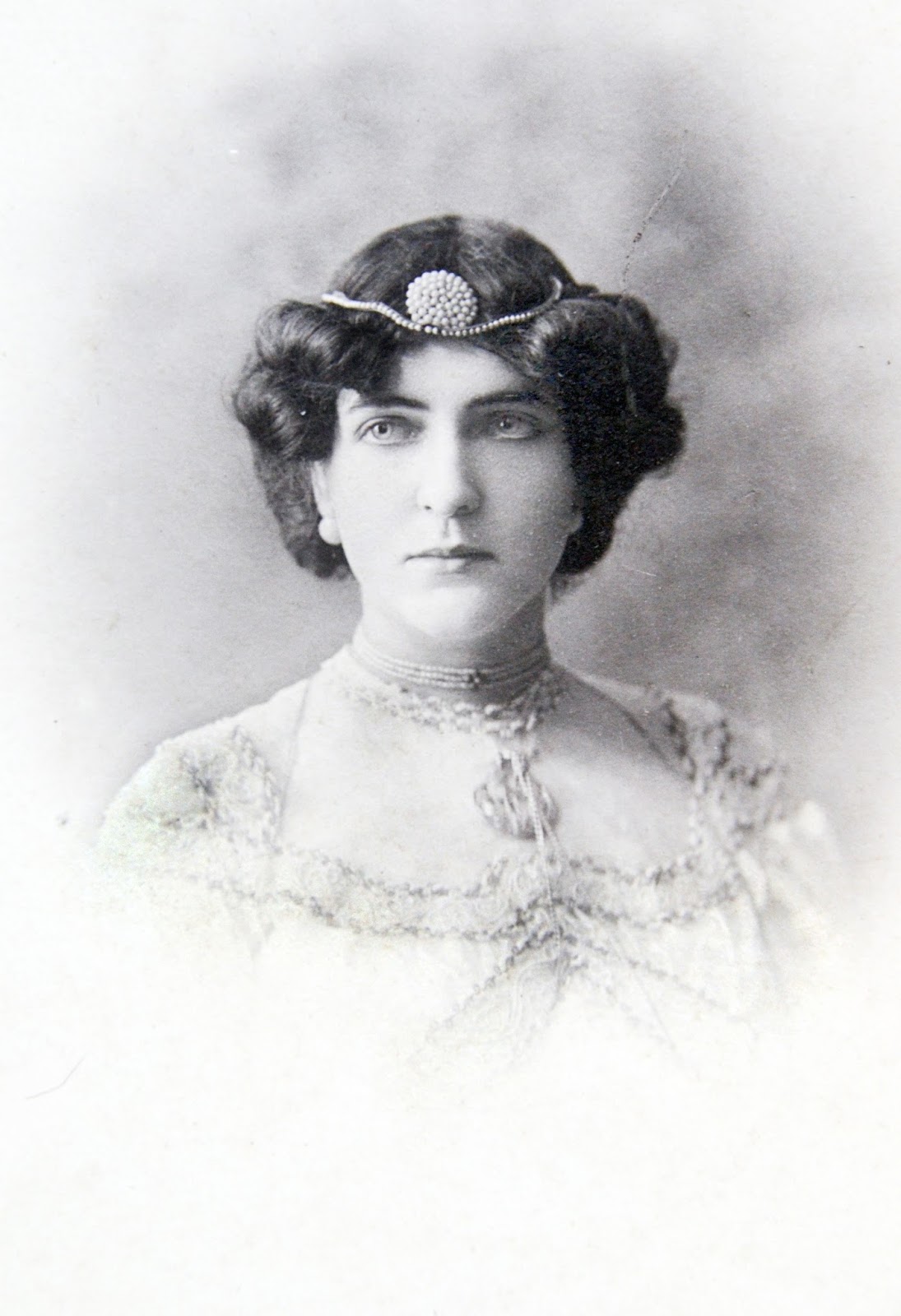 Delmira Agustini
Delmira Agustini
 Violeta Parra
Violeta Parra
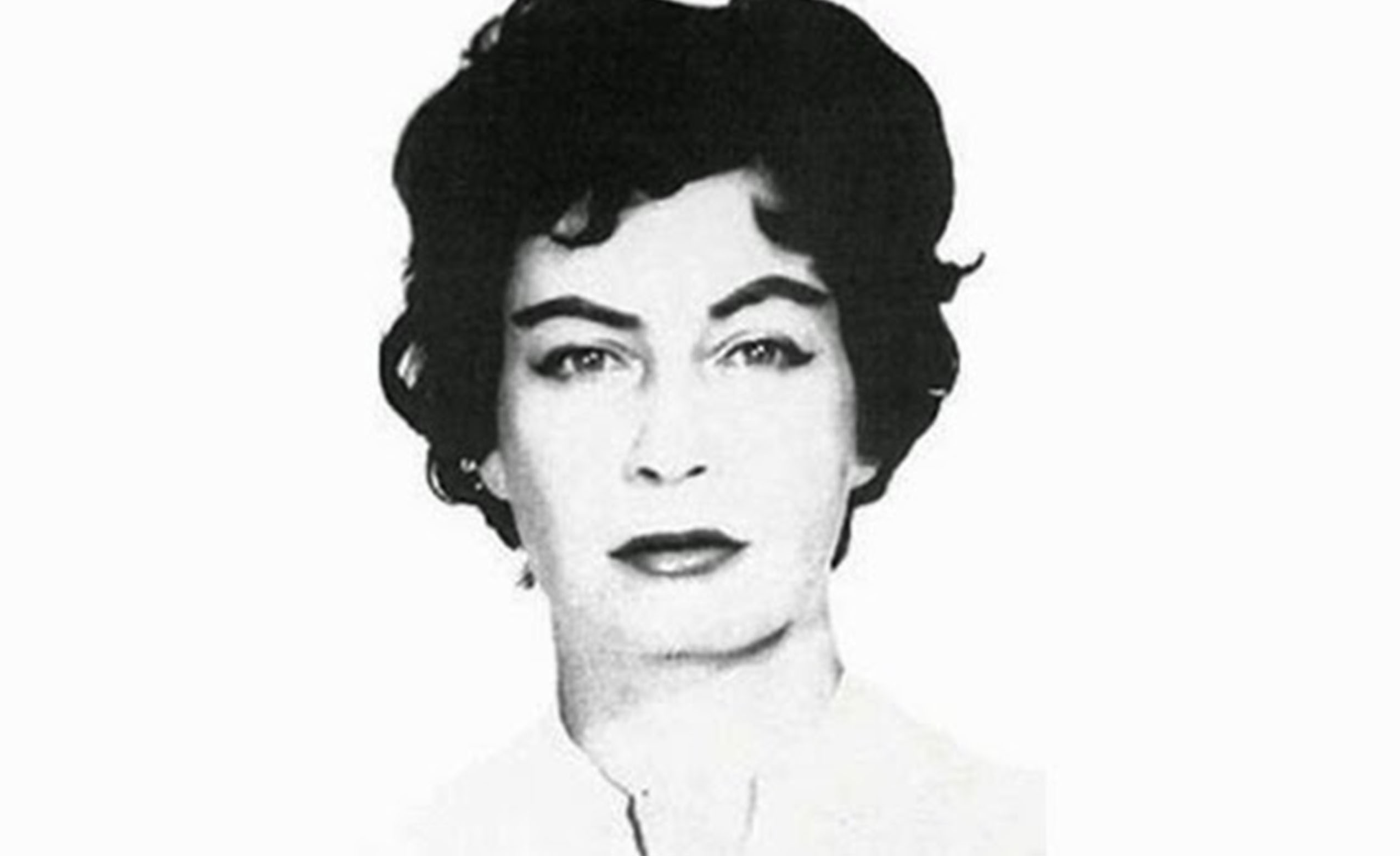 Eunice Odio
Eunice Odio
 Alejandra Pizarnik
Alejandra Pizarnik
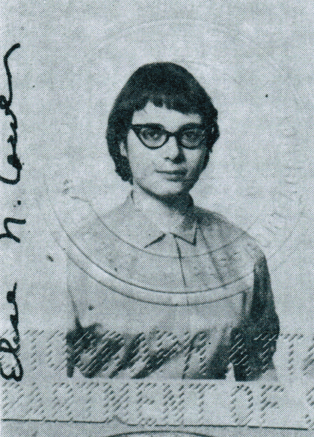 Elise Cowen
Elise Cowen
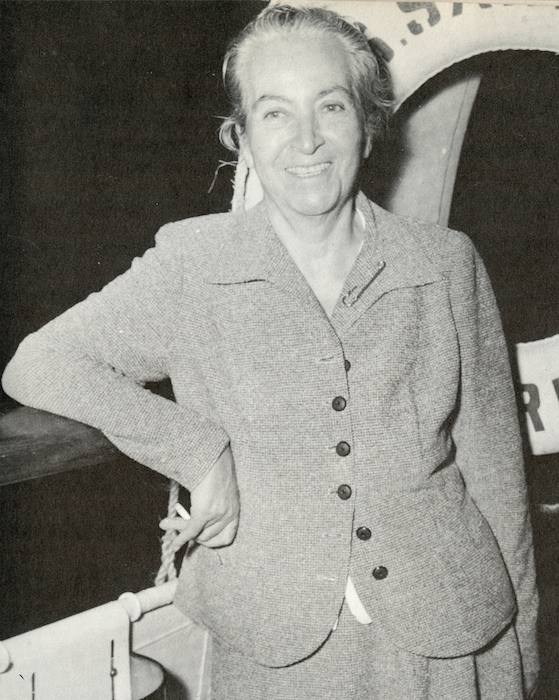 Gabriela Mistral
Gabriela Mistral
 Julia de Burgos
Julia de Burgos
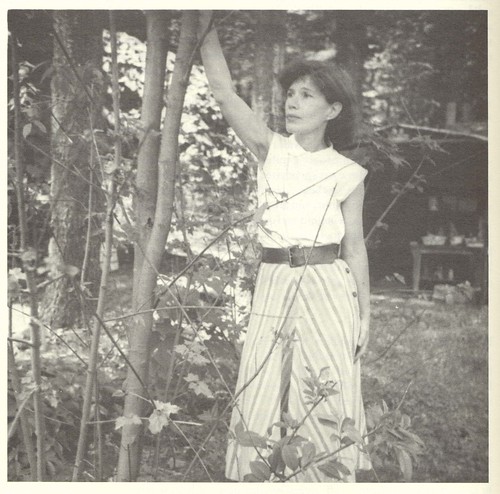 Marcia Nardi
Marcia Nardi
Links to Sharon Mesmer
“The Creation of Herself: Eunice Odio’s Mythopoetics” — American Poetry Review:
https://aprweb.org/poems/the-creation-of-herself-eunice-odio-s-mythopoetics
“Flood the World with Beauty” — American Poetry Review:
https://aprweb.org/poems/flood-the-world-with-beauty
“Knowledge That Speaks In Difficult Times” — in Teachers & Writers Magazine:
https://teachersandwritersmagazine.org/knowledge-that-speaks-in-difficult-times-an-interview-with-sharon-mesmer-7400.htm
“She Makes the Dirty Work Look Like a Degas” — from Hyperallergic:
https://hyperallergic.com/367698/she-makes-the-dirty-work-look-like-a-degas-interview-with-sharon-mesmer/
Q&A on the Poetry Society of America’s site:
https://poetrysociety.org/features/q-a-american-poetry-1/sharon-mesmer
“a talk with Sharon Mesmer” (by Edwin Torres) on the Harriet blog:
https://www.poetryfoundation.org/harriet-books/2012/04/poem-poet-a-talk-with-sharon-mesmer
Greetings from My Girlie Leisure Place from Bloof Books:
https://bloofbooks.com/product/greetings-girlie/
 Sharon Mesmer
Sharon Mesmer